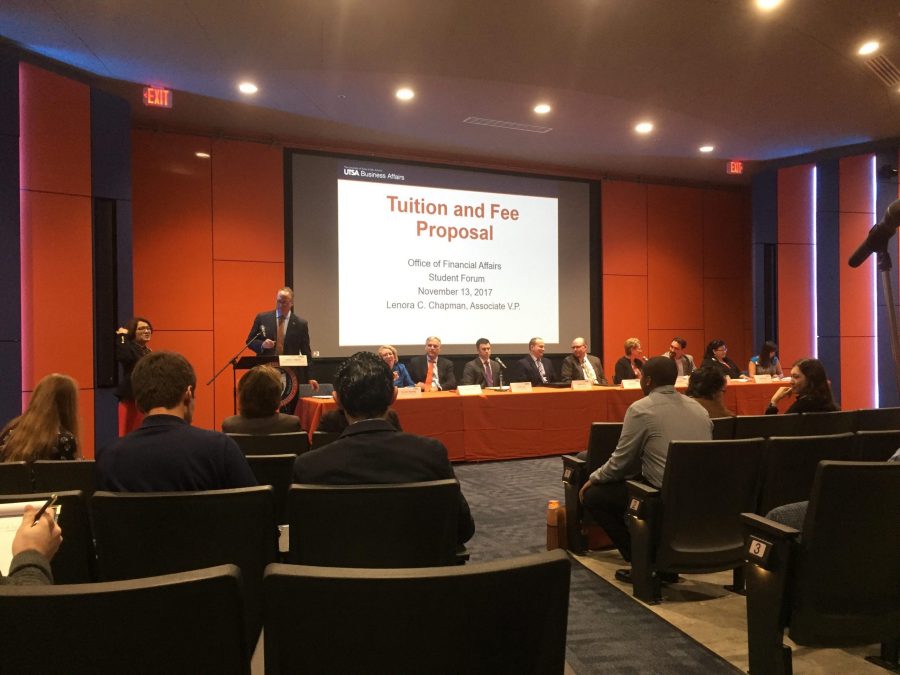After UTSA students voted down the athletics and transportation fee vote, UTSA President Taylor Eighmy will present the university’s tuition request to the UT System Board of Regents on February 27.
The proposal is the effort of the UTSA Tuition and Fees Committee, a 41 person council who met five times from September to November drafting the components of the proposal.
“Based on the committee’s feedback, as well as the input of local elected officials we consulted as a part of the process, the final proposal includes some new approaches to help us balance our many priorities,” Eighmy said.
The current proposal will consist of increases to both graduate and undergraduate tuition for residents and non-residents. The proposal will also include plans to raise certain mandatory and students fees.

“UTSA’s proposed tuition plans reflect the lowest rate increases of all the U.T. System institutions, and they are on-par with cost of living increases,” Eighmy said. The U.T. System Board of Regents require any new tuition and fee revenue be used to address initiatives in “student success, student support and faculty recruitment, (and) retention and excellence.,” according to an email by Eighmy outlining the proposal.
The proposal lists increases to tuition and fee increases for both traditional and guaranteed tuition rates. Traditional tuition rates can change with successful proposals and rate changes, while a guaranteed tuition plan lets undergraduate students maintain the same rate if they enroll in 30 course hours an academic year.
Undergraduate and graduate students who are Texas residents and using the traditional tuition rate can expect a four percent increase in designated tuition and a 3.2 to 3.5 percent increase in student fees, making the total academic cost (TAC) for undergraduates $5,301.33 by Fall 2019, and $4,552.06 for graduate students by Fall 2019. Non-resident students using the traditional tuition plan can expect a nine to 10 percent increase in designated tuition, and a 3.2 to 3.5 percent increase in mandatory fees, making the TAC $12,697.08 for undergraduate students and $13,190.40 for graduate students by Fall 2019.
Texas-resident students using the guaranteed tuition rate plan would experience a decrease of about 1.5 percent in their designated tuition rates, with non-residents experiencing a 2.3 percent increase in their designated tuition charges. Mandatory fees would increase for both at 3.2 to 3.5 percent. The TAC for Texas-resident undergraduates would be $5, 721.33, and $13,220.58 for non-resident undergraduates by Fall 2019. Guaranteed tuition rates are not offered to Texas-resident or non-resident graduate students.
Also included in the tuition proposal is a differential tuition rate for College of Business (COB) and College of Engineering (COE) students. COB students would be charged $42 per semester credit hour (SCH) for each upper division course they take, and COE students would be charged $55 per SCH for undergraduate courses. Graduate students in the College of Business would be charged $129 per SCH. COE graduate students would not have an additional charge.
The proposal states that differential tuition rates are to supply students of their respective colleges with technicians, increase course availability, provide an answering service for student questions, give undergraduates more internship opportunities and enhance learning spaces.
A Board of Regents decision on the proposal will be made by March 9. Open forums on the differential tuition outlined in the proposals will be held Feb. 20 from 12:00 p.m. to 1:00 p.m. in BSE 2.102 for the College of Engineering, and Feb. 20 and 21 from 4:00 p.m. to 5:30 p.m. in BB 3.04.08 for the College of Business. Students with questions regarding the process or proposal can contact Executive Director of Communications of the Office of the President Ann Peters at ann.peters@utsa.edu. To read the full proposal visit http://www.utsa.edu/financialaffairs/TuitionFees/proposals.html.









